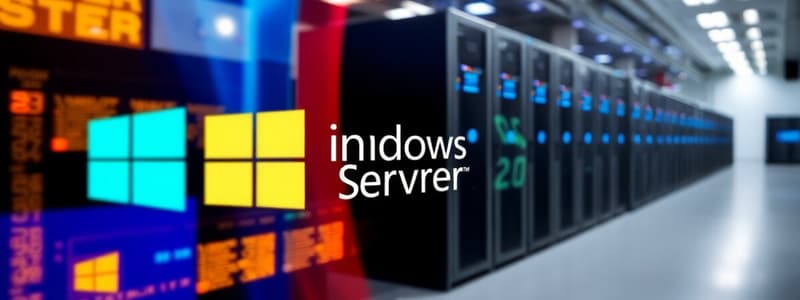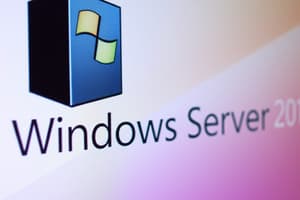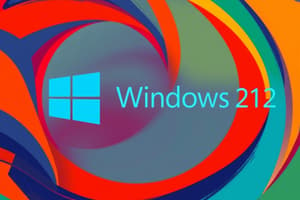Podcast
Questions and Answers
What is the primary function of a server operating system in a network?
What is the primary function of a server operating system in a network?
- To manage network resources and provide user interfaces
- To manage network resources and provide services such as authentication (correct)
- To serve as a backup system for data management
- To enhance hardware performance and optimize storage
Which edition of Windows Server 2012/R2 is designed explicitly for small businesses?
Which edition of Windows Server 2012/R2 is designed explicitly for small businesses?
- Essentials Edition (correct)
- Standard Edition
- Foundation Edition
- Datacenter Edition
What is the main function of Active Directory within a Windows Server 2012/R2 environment?
What is the main function of Active Directory within a Windows Server 2012/R2 environment?
- To automate software updates across the network
- To centralize management of users and network resources (correct)
- To provide network diagnostics and monitoring tools
- To create virtual machines on physical servers
What does a server core installation lack in Windows Server 2012/R2?
What does a server core installation lack in Windows Server 2012/R2?
Which Windows Server 2012/R2 edition supports unlimited virtual instances?
Which Windows Server 2012/R2 edition supports unlimited virtual instances?
What distinguishes a public cloud from a private cloud?
What distinguishes a public cloud from a private cloud?
Which service in Windows Server 2012/R2 automatically assigns IP addresses?
Which service in Windows Server 2012/R2 automatically assigns IP addresses?
What is the role of a hypervisor in Windows Server 2012/R2?
What is the role of a hypervisor in Windows Server 2012/R2?
What feature allows users to access their desktops from any internet connection in a private cloud?
What feature allows users to access their desktops from any internet connection in a private cloud?
Which two features provide fault tolerance in Windows Server 2012/R2?
Which two features provide fault tolerance in Windows Server 2012/R2?
What is the primary role of a domain controller?
What is the primary role of a domain controller?
What does IP Address Management (IPAM) primarily monitor and manage?
What does IP Address Management (IPAM) primarily monitor and manage?
What is the function of the Server Manager in Windows Server 2012/R2?
What is the function of the Server Manager in Windows Server 2012/R2?
How does Datacenter Edition differ from Standard Edition in Windows Server 2012/R2?
How does Datacenter Edition differ from Standard Edition in Windows Server 2012/R2?
What is the purpose of Dynamic Access Control in Windows Server 2012/R2?
What is the purpose of Dynamic Access Control in Windows Server 2012/R2?
Which feature is designed for servers that do not require a graphical user interface?
Which feature is designed for servers that do not require a graphical user interface?
What is Feature on Demand in Windows Server 2012/R2?
What is Feature on Demand in Windows Server 2012/R2?
What advantage does adding a second domain controller provide?
What advantage does adding a second domain controller provide?
What is the primary role of a DHCP server in a Windows Server environment?
What is the primary role of a DHCP server in a Windows Server environment?
How does planning for company growth benefit server management?
How does planning for company growth benefit server management?
What does the Hyper-V role in Windows Server 2012/R2 primarily enable?
What does the Hyper-V role in Windows Server 2012/R2 primarily enable?
What is a read-only domain controller (RODC)?
What is a read-only domain controller (RODC)?
Which of the following are hardware considerations for installing Windows Server 2012/R2?
Which of the following are hardware considerations for installing Windows Server 2012/R2?
What is the primary difference between a service pack and a patch?
What is the primary difference between a service pack and a patch?
Why is setting the correct time zone important during server installation?
Why is setting the correct time zone important during server installation?
Which network protocols are installed by default during a Windows Server 2012/R2 installation?
Which network protocols are installed by default during a Windows Server 2012/R2 installation?
When should you avoid using a Server Core installation?
When should you avoid using a Server Core installation?
What is the purpose of Windows Deployment Services (WDS)?
What is the purpose of Windows Deployment Services (WDS)?
What are the default password requirements for the Administrator account after installation?
What are the default password requirements for the Administrator account after installation?
What is one major benefit of adding a second domain controller to a network?
What is one major benefit of adding a second domain controller to a network?
Feature on Demand in Windows Server 2012/R2 allows the addition of unused feature installation files to save disk space.
Feature on Demand in Windows Server 2012/R2 allows the addition of unused feature installation files to save disk space.
What role does a DHCP server play in a Windows Server environment?
What role does a DHCP server play in a Windows Server environment?
The use of _______ in Windows Server 2012/R2 enables better support for running virtual machines.
The use of _______ in Windows Server 2012/R2 enables better support for running virtual machines.
Match the following features with their purposes in Windows Server 2012/R2:
Match the following features with their purposes in Windows Server 2012/R2:
Which of the following best describes a patch in Windows Server 2012/R2?
Which of the following best describes a patch in Windows Server 2012/R2?
Server Core installations include a full graphical user interface to facilitate easier management.
Server Core installations include a full graphical user interface to facilitate easier management.
What is the purpose of setting the correct time zone during server installation?
What is the purpose of setting the correct time zone during server installation?
Windows Deployment Services (WDS) simplifies the installation of Windows OS over a __________.
Windows Deployment Services (WDS) simplifies the installation of Windows OS over a __________.
Match the following installation considerations with their descriptions:
Match the following installation considerations with their descriptions:
How many times does a server typically restart during the installation of Windows Server 2012/R2?
How many times does a server typically restart during the installation of Windows Server 2012/R2?
Server Core can reduce resource usage in a branch office environment significantly.
Server Core can reduce resource usage in a branch office environment significantly.
When should you avoid using a Server Core installation?
When should you avoid using a Server Core installation?
Which of the following is a function of IP Address Management (IPAM)?
Which of the following is a function of IP Address Management (IPAM)?
Name one core technology of Windows Server 2012/R2.
Name one core technology of Windows Server 2012/R2.
A clean installation refers to installing Windows Server 2012/R2 as an upgrade from a previous version.
A clean installation refers to installing Windows Server 2012/R2 as an upgrade from a previous version.
Name one fault-tolerance feature supported by Windows Server 2012/R2.
Name one fault-tolerance feature supported by Windows Server 2012/R2.
The Datacenter Edition of Windows Server 2012/R2 allows for a limited number of virtual instances.
The Datacenter Edition of Windows Server 2012/R2 allows for a limited number of virtual instances.
Which of the following is a characteristic of a server core installation in Windows Server 2012/R2?
Which of the following is a characteristic of a server core installation in Windows Server 2012/R2?
What does the acronym VDI stand for?
What does the acronym VDI stand for?
Match the following features to their descriptions:
Match the following features to their descriptions:
In a Windows Server 2012/R2 environment, the purpose of the __________ server role is to resolve domain names to their corresponding IP addresses.
In a Windows Server 2012/R2 environment, the purpose of the __________ server role is to resolve domain names to their corresponding IP addresses.
Match each Windows Server 2012/R2 edition with its intended usage:
Match each Windows Server 2012/R2 edition with its intended usage:
What is the primary purpose of the Remote Access role in Windows Server 2012/R2?
What is the primary purpose of the Remote Access role in Windows Server 2012/R2?
What is the primary purpose of Active Directory Certificate Services (AD CS) in Windows Server 2012/R2?
What is the primary purpose of Active Directory Certificate Services (AD CS) in Windows Server 2012/R2?
Datacenter Edition of Windows Server 2012/R2 allows up to two virtual instances.
Datacenter Edition of Windows Server 2012/R2 allows up to two virtual instances.
The __________ provides a centralized interface for managing server roles in Windows Server 2012/R2.
The __________ provides a centralized interface for managing server roles in Windows Server 2012/R2.
Virtualization allows only one operating system to run on a physical server simultaneously.
Virtualization allows only one operating system to run on a physical server simultaneously.
What is a hypervisor?
What is a hypervisor?
Flashcards are hidden until you start studying
Study Notes
Introducing Windows Server 2012/R2
- Primary function of a server operating system: Manages network resources, provides authentication, data storage, and application hosting.
- Windows Server 2012/R2 Editions: Datacenter, Standard, Essentials (for small businesses with up to 25 users), and Foundation.
- Server Core Installation: Minimal installation option with no graphical user interface (GUI), prioritizing performance and security.
Understanding Virtualization
- Virtualization: Allows multiple operating systems to run on a single physical server using virtual machines (VMs).
- Virtual Machine (VM): A software-based simulation of a physical computer, able to run an operating system and applications.
- Public Cloud: Third-party service accessible over the internet.
- Private Cloud: Managed by an organization's own IT.
Core Technologies
- Server Manager: Centralized interface for server management, including roles, diagnostics, and configuration.
- Active Directory: Provides centralized authentication, authorization, and management of users and network resources.
- Microsoft Management Console (MMC): A console for managing system components and configurations.
- Hypervisor: A software component that manages and monitors virtual machines on a host computer.
Essential Network Roles
- Dynamic Host Configuration Protocol (DHCP) Server: Provides automatic IP address assignment.
- Active Directory Certificate Services (AD CS): Creates, issues, and manages digital certificates.
- Domain Name System (DNS) Server: Resolves domain names to their corresponding IP addresses.
- Virtual Desktop Infrastructure (VDI): Enables users to access their desktops from any internet connection in a private cloud.
Fault Tolerance and Security
- Redundant Array of Independent Disks (RAID): Provides fault tolerance by storing data on multiple disks.
- Load Balancing: Distributes network traffic across multiple servers to improve performance and availability.
- Domain Controller: Manages network resource access, user authentication, and security policies.
- IP Address Management (IPAM): Monitors and manages DHCP and DNS servers, allowing for IP address usage audits.
- Distributed File System (DFS): Simplifies file access by grouping shared folders under a single namespace.
Installation and Configuration
- Clean Installation: New installation on a disk partition, not an upgrade.
- Static IP Address: Ensures consistent access to network services without changing the server's address.
- Read-Only Domain Controller (RODC): Holds a read-only copy of the Active Directory database.
Post-Installation Process
- Server Administrator Role: Configures server settings, sets up server roles, manages updates and security.
- Windows Deployment Services (WDS): Simplifies network-based Windows OS installations.
- Server Activation: Ensures compliance with licensing requirements and enables full server functionality.
- Feature on Demand: Allows removal of unused installation files to save disk space.
Additional Considerations
- Hyper-V: Role used to create and manage virtual machines for various environments.
- Member Server: Server within a domain without the domain controller role.
Introducing Windows Server 2012/R2
- Server Operating System Function: Manages network resources, provides authentication, data storage, and application hosting.
- Windows Server 2012/R2 Editions: Datacenter, Standard, Essentials, and Foundation.
- Essentials Edition: Designed for small businesses with up to 25 users.
- Server Core Installation: Minimal installation with no graphical user interface (GUI), focusing on security and performance.
- Virtualization in Windows Server 2012/R2: Allows running multiple operating systems on a single physical server using virtual machines (VMs).
- Active Directory Role: Centralized management for authentication, authorization, and user and resource management.
- Virtual Machine (VM): Software-based simulation of a physical computer.
- Public vs. Private Cloud: Public cloud is provided by third-party services over the internet. Private cloud is managed by the organization's IT department.
- Core Technologies: Server Manager, Active Directory, Microsoft Management Console (MMC).
- Hypervisor: Software that manages and monitors virtual machines on a host computer.
- DHCP Server Role: Provides automatic IP address assignment.
- Active Directory Certificate Services (AD CS): Creates, issues, and manages digital certificates.
- Datacenter Edition: Unlimited virtual instances allowed.
- DNS Server Role: Resolves domain names to corresponding IP addresses.
- Virtual Desktop Infrastructure (VDI): Enables user desktop access through any internet connection in a private cloud.
- Fault Tolerance Features: RAID (Redundant Array of Independent Disks) and load balancing.
- Domain Controller Role: Manages network resource access, authenticates users, and enforces security policies within a domain.
- IP Address Management (IPAM): Monitors and manages DHCP and DNS servers, analyzing IP address usage.
- Server Manager Function: Centralized interface for server management, troubleshooting, and configuration.
- Distributed File System (DFS): Simplifies file access by grouping shared folders under a single namespace.
- Datacenter vs. Standard Edition: Datacenter Edition allows unlimited virtual instances, while Standard Edition allows a maximum of two.
- Server Core Feature: Provides streamlined installation for servers without GUI, with focus on reduced resources and streamlined operation.
- Remote Access Role: Configures a server as a VPN server or DirectAccess server for secure remote access.
- Dynamic Access Control: Granular control over file access based on user attributes and file properties.
- PowerShell Cmdlets: Lightweight commands used for various management tasks in the PowerShell environment.
Installing Windows Server 2012/R2
- Clean Installation: Fresh installation on a new disk partition, without upgrading from previous versions.
- Static IP Address Assignment: Ensures consistent access to network services without the need for server address changes.
- Installation Planning: Considering factors like hardware requirements, server roles, network protocols, and IP addressing.
- Read-only Domain Controller (RODC): Holds a read-only copy of the Active Directory database.
- Hardware Considerations: CPU architecture, RAM capacity, and disk subsystem capabilities.
- Patches: Updates that fix bugs and security issues, applied through Windows Update.
- Service Pack vs. Patch: Service pack is a collection of patches and updates, while a patch addresses specific issues.
- Time Zone Setting Importance: Affects user authentication and task scheduling.
- Server Core Installation Benefits: It reduces resources by removing the GUI and non-essential features.
- Default Network Protocols: TCP/IPv4 and TCP/IPv6.
- Server Core Benefits in Branch Offices: Reduced resource usage and enhanced remote management for security.
- Avoiding Server Core: Use in scenarios requiring features not supported by Server Core or by administrators unfamiliar with command-line tools.
- Server Restart Frequency: Typically two restarts occur during the Windows Server 2012/R2 installation.
- Windows Deployment Services (WDS): Simplifies Windows OS installation over a network.
- Post-installation Administrator Role: Configuring server settings, establishing roles, and managing updates and security.
- Administrator Account Password Requirements: Minimum length of three characters, including combinations of uppercase letters, lowercase letters, numbers, and special symbols.
- Server Activation Importance: Ensures licensing compliance and enables full functionality.
- Feature on Demand: Enables the removal of unused feature installation files to save disk space.
- Adding a Second Domain Controller: Improves fault tolerance and load balancing for authentication and other services.
- DHCP Server Role in Windows Server: Automatic IP address and configuration settings assignment to client devices.
- Windows Server 2012/R2 Security Enhancement: Through roles like Active Directory, DNS, and Dynamic Access Control.
- Virtualization Extensions Impact: Enhance Hyper-V support for running virtual machines, improving performance.
- Planning for Company Growth: Preventing server overload and ensuring scalability.
- Hyper-V Role Function: Creates and manages virtual machines for testing, development, and production environments.
- Member Server in a Windows Domain: A server in a domain that does not have the domain controller role installed.
Studying That Suits You
Use AI to generate personalized quizzes and flashcards to suit your learning preferences.




